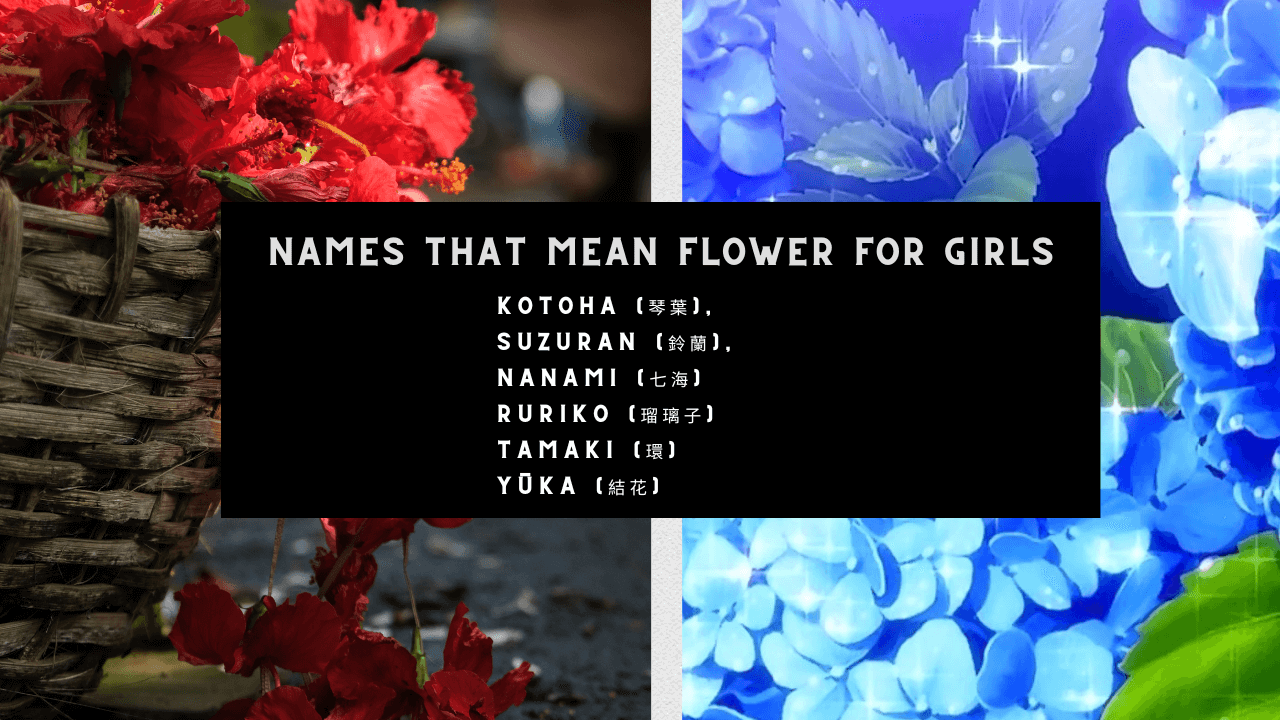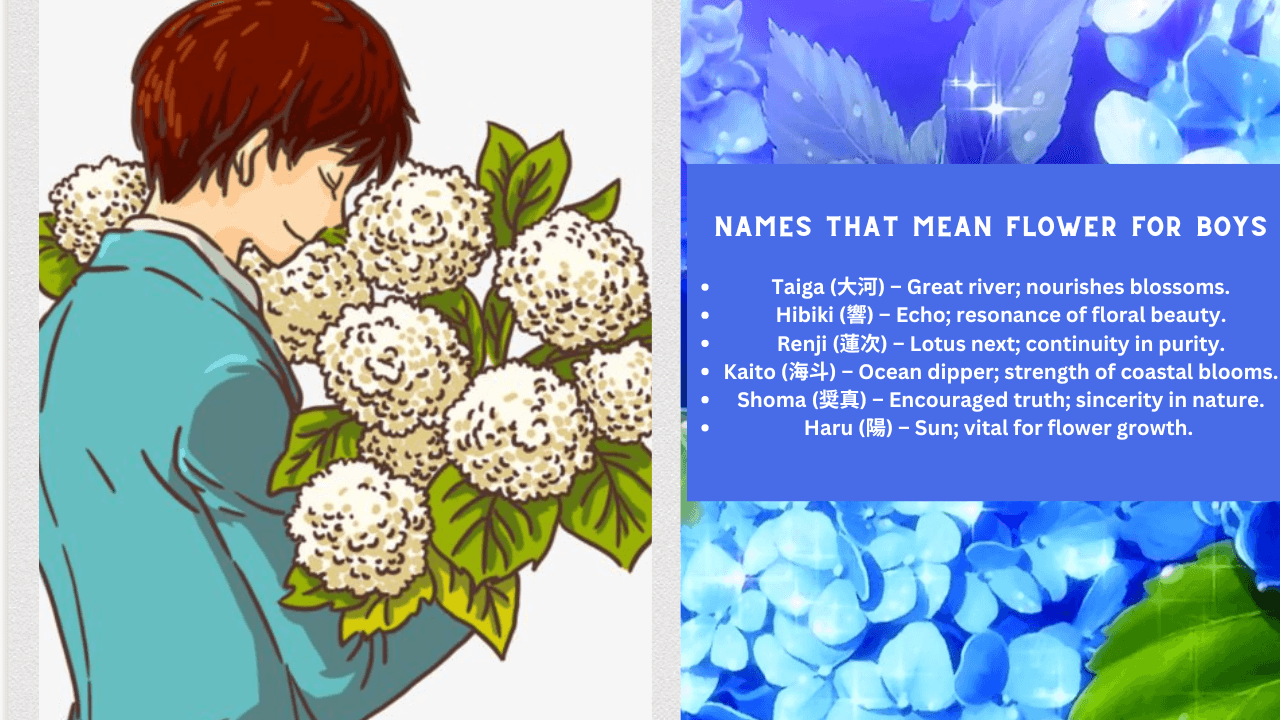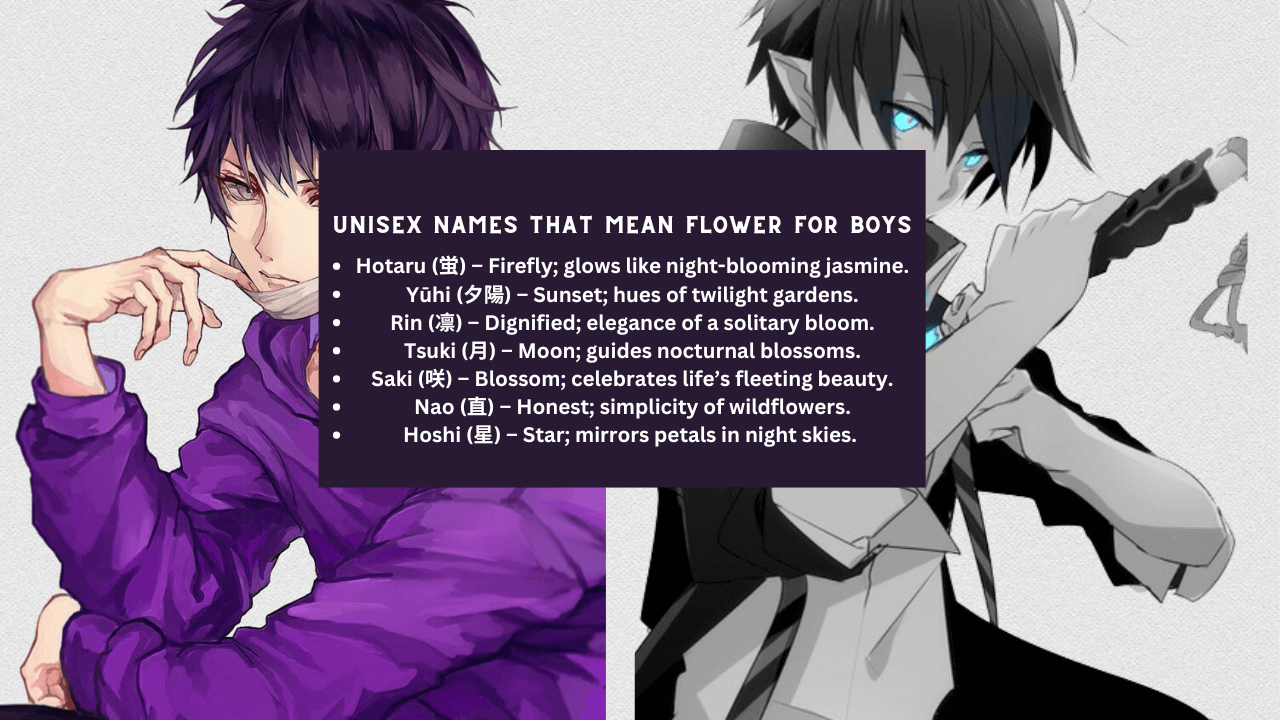In Japanese culture, names play an important role. For an individual and their parents, it is a big responsibility to give a child the right name they deserve because names have an impact on a person for the rest of their life. Japanese names that mean “flower” are one of the best categories to choose a name from. Flowers, with their fleeting beauty and profound symbolism, have long inspired Japanese naming traditions.
The iconic cherry blossom and the resilient chrysanthemum are just two examples of floral names that carry meanings resonating with seasonal rhythms, personal virtues, and cultural values. Parents often select these names to imbue their children with qualities admired in nature, creating a lifelong connection to Japan’s rich botanical heritage. Here we are about to share the ultimate list of Japanese Names which mean flower.
Popular Japanese Names That Mean Flower for Girls
- Kotoha (琴葉) – Harp leaf; symbolizes harmony and delicate beauty.
- Suzuran (鈴蘭) – Lily of the valley; purity and renewal.
- Nanami (七海) – Seven seas; reflects boundless beauty like ocean flowers.
- Ruriko (瑠璃子) – Lapis lazuli child; rare gem-like floral elegance.
- Tamaki (環) – Ring; symbolizes eternal blooming cycles.
- Yūka (結花) – Binding flower; unity and lasting bonds.
- Himawari (向日葵) – Sunflower; loyalty and radiant joy.
Here we have handpicked some of the best feminine names for your baby, Girls’ names rooted in flowers often emphasize grace and delicacy. For example one of the most popular name, Sakura (cherry blossom) remains a timeless favorite, symbolizing fleeting beauty and new beginnings, And Hana, meaning “flower,” is a versatile classic, while Yuri (lily) embodies purity and elegance.

- Sakiyo (咲代) – Blossoming era; celebrates flourishing life.
- Koharu (小春) – Little spring; early blooms and freshness.
- Ran (蘭) – Orchid; sophistication and quiet strength.
- Tsukiko (月子) – Moon child; night-blooming flowers’ mystique.
- Hotaru (蛍) – Firefly; evokes glowing evening blossoms.
- Momo (桃) – Peach blossom; longevity and vitality.
- Natsumi (夏美) – Summer beauty; vibrant seasonal blooms.
- Yūri (悠里) – Distant lily; serenity and timeless grace.
- Suzu (鈴) – Bell; chimes with delicate flower-like clarity.
- Kazemi (風見) – Wind-view; petals dancing in breezes.
- Tsubaki (椿) – Camellia; devotion and perfect love.
- Sakuko (咲子) – Child of blossoms; celebrates blooming life.
- Hinano (陽菜乃) – Sunflower’s light; warmth and growth.
- Ume (梅) – Plum blossom; resilience and early hope.
- Mariko (真理子) – Truth child; honesty mirrored in pure blooms.
- Yōko (陽子) – Sun child; radiant as sunlit petals.
- Fuyumi (冬美) – Winter beauty; blooms defying cold.
- Satsuki (皐月) – Fifth month; late spring florals.
- Akari (灯) – Light; illuminates flowers’ hidden grace.
- Riko (莉子) – Jasmine child; gentle and fragrant charm.
- Botan (牡丹) – Peony; prosperity and bold elegance.
- Kiyomi (清美) – Pure beauty; flawless as dewdrop petals.
- Mai (舞) – Dance; petals swaying in nature’s rhythm.
Also Read – 89+ Names That Mean ‘Beautiful’ and Their Origins 🌸
Unique Japanese Names That Mean Flower for Boys
While floral names are less common for boys, There are still several names which you may like, Such as Ren (lotus) signifies purity and resilience, inspired by the flower’s ability to thrive in challenging environments, while Kaito (ocean fighter) mirrors the strength of flowers that withstand harsh conditions.

- Kaien (海苑) – Sea garden; symbolizes the union of water and blooms.
- Soushi (草志) – Grass ambition; resilience of wildflowers.
- Tsubasa (翼) – Wing; evokes petals carried by wind.
- Ranmaru (蓮丸) – Lotus circle; purity and strength.
- Hayato (隼翔) – Falcon soaring; speed and grace of blooming.
- Minoru (実) – Bearing fruit; ties to flowering plants’ lifecycle.
- Kazuto (和人) – Harmony person; balance in nature’s garden.
- Itsuki (樹) – Tree; rooted strength like ancient blooms.
- Yūto (悠斗) – Leisurely measure; calm growth of petals.
- Sora (宙) – Sky; boundless as fields of flowers.
- Taiga (大河) – Great river; nourishes blossoms.
- Hibiki (響) – Echo; resonance of floral beauty.
- Renji (蓮次) – Lotus next; continuity in purity.
- Kaito (海斗) – Ocean dipper; strength of coastal blooms.
- Shoma (奨真) – Encouraged truth; sincerity in nature.
- Haru (陽) – Sun; vital for flower growth.
- Ryūsei (流星) – Shooting star; fleeting as cherry blossoms.
- Takumi (匠) – Artisan; craftsman of natural beauty.
- Yūki (勇気) – Courage; boldness of desert blooms.
- Satoshi (聡) – Wise; understanding floral cycles.
- Daichi (大地) – Great earth; foundation for blossoms.
- Akio (昭夫) – Bright man; clarity in spring gardens.
- Isamu (勇) – Brave; resilience of winter flowers.
- Nobuyuki (信之) – Trusted journey; reliability of perennial blooms.
- Tomohiro (智宏) – Wise prosperity; flourishing like petals.
- Yūsuke (勇介) – Brave helper; protects delicate blooms.
- Kazuki (一輝) – One radiance; singular beauty of a bud.
- Ryota (涼太) – Refreshingly bold; coolness of evening blossoms.
- Shinji (真二) – True second; enduring as seasonal flowers.
- Makoto (誠) – Sincere; honest as unfurling petals.
Also Read – 99+ Japanese Names That Mean Butterfly For [Boys & Girls]
Gender-Neutral Japanese Names with Flower Meanings
Some names transcend gender, offering flexibility while retaining floral charm. Aoi (hollyhock) symbolizes endurance. Sakura, though often feminine, can also suit boys in some scenario because of the universal appeal of cherry blossoms. Ren (lotus) and Hinata (sunflower) are other unisex options, embodying themes of light and growth.

- Akira (明) – Bright; symbolizes the vivid hues of petals in sunlight.
- Sora (空) – Sky; boundless as fields of wildflowers.
- Hikaru (光) – Radiance; mirrors the glow of dewy blooms.
- Kai (海) – Ocean; reflects coastal flora’s resilience.
- Ren (蓮) – Lotus; purity rising from murky waters.
- Nagi (凪) – Calm; evokes still gardens in bloom.
- Yū (悠) – Leisurely; petals drifting in gentle winds.
- Haru (陽) – Sun; vital for buds to unfurl.
- Kohaku (琥珀) – Amber; warmth of autumn blossoms.
- Rui (涙) – Teardrop; delicate as morning dew on petals.
- Asa (朝) – Morning; freshness of dawn blooms.
- Natsu (夏) – Summer; vibrance of seasonal florals.
- Suzu (鈴) – Bell; chimes with flower-like clarity.
- Towa (永遠) – Eternity; perennial beauty of reblooming.
- Aoi (葵) – Hollyhock; endurance through storms.
- Kaze (風) – Wind; carries seeds for new growth.
- Hotaru (蛍) – Firefly; glows like night-blooming jasmine.
- Yūhi (夕陽) – Sunset; hues of twilight gardens.
- Rin (凛) – Dignified; elegance of a solitary bloom.
- Tsuki (月) – Moon; guides nocturnal blossoms.
- Saki (咲) – Blossom; celebrates life’s fleeting beauty.
- Nao (直) – Honest; simplicity of wildflowers.
- Hoshi (星) – Star; mirrors petals in night skies.
- Rei (麗) – Lovely; grace of a curated garden.
- Kokoro (心) – Heart; core of a flower’s allure.
- Yūki (雪希) – Snow hope; resilience of frost-defying blooms.
- Minori (実) – Fruit; fulfillment after flowering.
- Suzume (雀) – Sparrow; lightness of petals in flight.
- Akari (灯) – Light; reveals hidden floral grace.
- Fūka (風香) – Wind scent; carries fragrance of distant blooms.
Also Read – 99+ Beautiful Japanese Names Meaning Moon
Conclusion
Japanese names that mean flower beautifully reflect the deep connection between humanity and nature. Selected for their poetic resonance or significant meaning, these names uphold traditions that celebrate the seasons, virtues, and the brief moments of life. From the delicate Sakura to the steadfast Ren, each name is a seed of hope, blossoming into its own unique story.